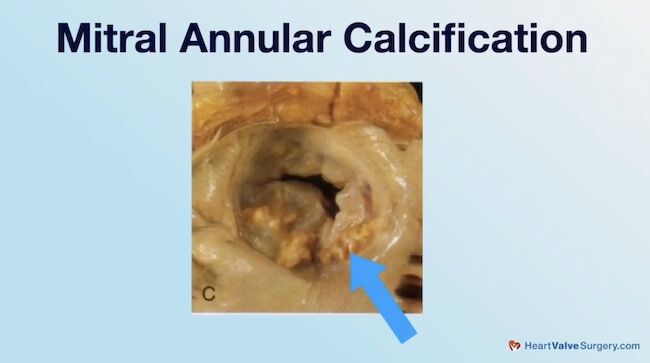Surgeon Q&A: Mitral Annular Calcification, Preventing Stroke During Valve Surgery, and Calcium Supplements
Written By: Allison DeMajistre, BSN, RN, CCRN
Medical Expert: Patrick McCarthy, MD, Executive Director, Bluhm Cardiovascular Institute, Northwestern Medicine
Reviewed By: Adam Pick, Patient Advocate, Author & Website Founder
Published: August 7, 2024
In recent years, the diagnosis of mitral annular calcification (“MAC”) has been more prevalent in our patient community. As a result, we are receiving many patient questions about the management and the treatment of MAC. For example, Bruce just asked us three questions specific to mitral annular calcification, mitral valve surgery, stroke risks, and the impact of calcium supplements on the mitral valve.
To answer Bruce’s questions, we were thrilled to meet with Dr. Patrick McCarthy, Executive Director of the Bluhm Cardiovascular Institute at Northwestern Medicine in Chicago, Illinois. As you may know, Dr. McCarthy is a mitral valve guru who just received his 200th testimonial from patients in our community.
Key Learnings About Mitral Annular Calcification and Mitral Valve Surgery
Here are the important medical insights from Dr. McCarthy:
- First, Bruce asked, “I am a 72-year-old retired primary care physician who was just diagnosed with severe mitral regurgitation and a flail leaflet. In addition, I have severe mitral annular calcification, or MAC. I recently went into heart failure necessitating a three-day hospitalization with a complete recovery. What is it about MAC that makes it difficult to operate on?” Dr. McCarthy replied, “It’s a great question, Bruce. Unfortunately, it’s not that common because it’s a real surgical challenge.” Dr. McCarthy explained that two things happen with MAC. First, the mitral valve is pulled apart and broken and can’t close properly, which causes the valve to leak. In addition, the broken piece of the valve creates tension at the base of the leaflet and starts to create fibrous tissue, which forms calcium. “When we’re doing an operation, we put sutures through that area of the annulus,” said Dr. McCarthy. “That may be where we put a ring, or we put a replacement. We have to worry that the sutures go in deep enough that they hold and don’t leak around there. Sometimes when it’s truly severe MAC, we may have to remove it. That adds an extra step and it can be pretty tricky, so be careful about choosing your surgeon that they’re pretty experienced in doing that.”

- Next, Bruce asked, “When doing open chest surgery on a patient with lots of calcification, is it recommended to put filters up the carotids to avoid embolic stroke from calcium chips?” Dr. McCarthy answered, “It’s not necessary that you do the filters at that time because what’s happening is the heart is stopped. We have this cross clamp that stops it, and so we’re working inside the heart.” Dr. McCarthy explained that they are extremely careful about removing all of the calcium with high-power suction devices. “We irrigate with saline so that we remove all of that calcium before we start the heart again. The filter wouldn’t really help too much with that,” he said.
- Finally, Bruce asked, “Did my 10-year history of taking calcium supplements contribute to severe MAC?” Dr. McCarthy said, “Another great question. If I knew the answer, I would win the Nobel Prize. We think that number one, just the trauma of the valve leaflet and then the pressure it puts on the valve is the contributing factor. We are a little suspicious of people who take calcium supplements or Boniva, some of those things that have been out there before that may accelerate it. It’s not as if we can say for certain that it’s related, but it might be.”
Thanks Dr. McCarthy and the Northwestern Medicine Team!
On behalf of Bruce and our entire patient community, thank you to Dr. Patrick McCarthy for his informative answers about mitral annular calcification, mitral valve surgery, and calcium supplements! We also want to thank Dr. McCarthy’s team at Northwestern Medicine for taking great care of our heart valve patients!
Related Links:
- Surgeon Spotlight: Dr. McCarthy Gets His 200th Patient Review
- Dr. McCarthy’s Mitral Valve Patient Success Story: Edward Clinton
Keep on tickin!
Adam
P.S. For the deaf and hard-of-hearing members of our patient community, I have provided a written transcript of the video interview with Dr. McCarthy below.
Video Transcript:
Adam: Hi everybody, it’s Adam with heartvalvesurgery.com. We’re in San Antonio at the annual meeting of The Society of Thoracic Surgeons. I am thrilled to be joined by Dr. Patrick McCarthy, who is the executive director of the Bluhm Cardiovascular Institute at Northwestern Medicine in Chicago, Illinois. Dr. McCarthy, we’ve known each other for over 10 years. It is always great to see you and thanks so much for being with me today.
Dr. McCarthy: My pleasure.
Adam: Yeah, so we’re here at STS. A lot of great research is coming out, new data, and we’re also getting questions from patients all over the world. We got a special one for you because you’re so skilled in mitral valve surgery. This comes in from Bruce and he says, “I am a 72-year-old retired primary care physician who was just diagnosed with severe mitral regurgitation and a flail leaflet. In addition, I have severe mitral annular calcification or MAC. I recently went into heart failure necessitating a three-day hospitalization with a complete recovery. What is it about severe MAC that makes it difficult to operate on?”
Dr. McCarthy: Yeah, it’s a great question, Bruce. Unfortunately, it’s not that common because it’s a real surgical challenge. What’s happening is two things is one, the valve should hit together like this, but when it’s pulled apart and broken like that, which is what happens when you have that leaky valve, all that tension at the base of the leaflet starts to create fibrous tissue and the fibrous tissue forms calcium. When we’re doing an operation, we put sutures through that area of the annulus. That may be where we put a ring or we put a replacement. We have to worry that the sutures go in deep enough that they hold that it doesn’t leak around there. Sometimes when it’s truly severe MAC, we call it mitral annular calcification, we may have to remove it. That adds an extra step and it can be pretty tricky, so be careful about choosing your surgeon that they’re pretty experienced in doing that.
Adam: Yeah, and the next question that comes in from Bruce, Dr. McCarthy, is when doing open chest surgery on a patient with lots of calcification, is it recommended to put filters up the carotids to avoid embolic stroke from calcium chips?
Dr. McCarthy: Yeah, so it’s not necessary that you do the filters at that time because what’s happening is the heart is stopped. We have this cross clamp that stops it, and so we’re working inside the heart. We remove that calcium and then we’re super careful about removing any of it. We have these high power suction devices that we use. We irrigate with saline so that we remove all of that calcium before we start up again. The filter wouldn’t really help too much with that.
Adam: Bruce has one final follow up, which is, did my 10 year history of taking calcium supplements contribute to severe MAC?
Dr. McCarthy: Another great question. If I knew the answer, I would win the Nobel Prize. We think that, number one, just that sort of trauma of the valve leaflet and then the pressure that it puts on it, that is the contributing factor. We are a little suspicious of people that take calcium supplements or Boniva, some of those things that have been out there before, but that may accelerate it. It’s not as if we can say for certain that it’s related, but it might be.
Adam: Wow. Bruce, I hope that helped you. Dr. McCarthy, I know it helped me learn more about MAC and filters and calcium supplements. On behalf of Bruce and our entire patient community, thanks so much for everything you and your team are doing in Northwestern Medicine.
Dr. McCarthy: Thank you, Adam, for what you do for the patients all around the world. It’s been a great journey.
Adam: Yeah, thanks so much.





